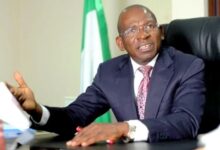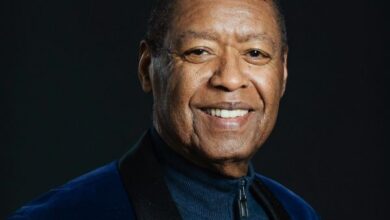MATTERS ARISING: The Boko Haram ‘Dialogue’…
With the olive branch of ‘dialogue’ extended to the federal government by a faceless Boko Haram representative, there just might be light at the end of the tunnel with regards to the heinous activities of the sect. The only problem is that the said dialogue is being predicated on impossible conditions with former Head of State Alhaji Mohammadu Buhari stoutly declining the group’s request to represent them in the parley.
The federal government in its earlier invitation of dialogue stated that the basis will be for the group to unveil itself as the government would not dialogue with a faceless group. Now that the group has indicated its readiness to end its campaign of violence, it came with a condition that ex-Borno State governor. Ali Modu Sheriff, be arrested and peace talks held in Saudi Arabia and also for compensation for families of its members killed in the course of its terrorist acts and the rebuilding of its mosques by the federal government.
Should the government dialogue despite the annoying conditions simply because we are desperate to end bloodshed? What would be the compensation for those who have lost family members and properties to the cruelty of the sect? If we succumb to it, are we not setting a bad precedence? These questions would linger on even as the government navigates a means to the end of bloodshed in the land. For now, worshippers in the North can hardly worship in peace and the evil perpetrators hiding under the Boko Haram infamous umbrella continue with their campaigns of hate and calumny. ion from the room rather than the field!
One Nation, Two Destinies?
The Federal Executive Council in its recent meeting approved a sum of N2.2 billion for the construction of a new banquet hall in the presidential villa. According to the Special Adviser to the President on Media and Publicity, Dr. Ruben Abati, the new banquet hall will have a capacity of 150 seats. The approval is part of the final set of N19.4 billion contracts for this year covering road construction, rail transportation and infrastructural development in the Federal Capital Territory.
It would be recalled that the president in the heat of subsidy protest earlier in the year stated that he and members of his cabinet would forfeit certain parts of their salaries but many commentators were not impressed as they argued that salaries constituted a negligible part of public servants’ emoluments. The devil they argued was in the allowances and extravagant projects. It would seem that the President is confirming that stance with this recent announcement. It appears that whenever there is a need to make a sacrifice; the common man is the first to be compelled to do so, while the beat goes on for the ruling class.
While addressing the nation during his recent media chat, the president asked Nigerians to bear with the government on the scarcity of PMS; he wouldn’t have known the stress an average Nigerian goes through before buying petrol with his own money. Having demanded continuous endurance of prevalent hardship form Nigerians, how is the government sharing the burden with the people?
On the backdrop of this approval by the FEC, how would the proponent of ‘necessary sacrifice’ defend his actions? What has the new banquet hall got to contribute to the present situation of the country? Of what benefit is it to the people and who are those it would benefit? Is it just meant to give Nigeria an international standard outlook? If this is the case, should the standard be built at the detriment of the nation itself?
The plight of an average Nigerian viz-a-viz the jaw-dropping monetary figures flowing in the air only triggers the discerning mind to ask if these monies are being spent in this same Nigeria or there is another Brand Nigeria being built somewhere else. Any way didn’t someone say that life is different strokes for different folks…?
The House Annual Ritual
The House of Representative is going through the annual ritual with different Ministries, Departments and Agencies, MDAs, as they are taking their turns to account for their budget of 2012. The sessions are used to examine the budget performance of each agency for the year.
Not every agency would have matched performance with what was given as budget, therefore not all ministers in the process would provide satisfactory defense and some sessions are expected to generate heated arguments. This annual process should not just come and go like it has always been. Things are not working as they should be, yet these ministers seem to always get the approval of the House on whatever they present. Who is to blame the executive or the ‘over-sighters’?
…Towards a People’s Constitution
The National Assembly recently took its constitutional amendment process to 109 federal constituencies and six geopolitical zones of the federation, to enable many Nigerians participate in the constitution review. The interactive session has afterwards produced variety of opinions from Nigerians, with the majority advocating more states and the need for true federalism, and the north requesting capital punishment for corruption.
The gesture to have a truly people’s constitution is commendable. Though Nigerians have been given the room to have their say, they would definitely not be there on the floor of the Assembly when the final decision will be taken. Having only the say would not amount to the people’s constitution. It is only if the wishes expressed by the people are entrenched in it that it could truly be referred to as the constitution of “we the people of Nigeria”.
Total to Sell Assets in Nigeria
Total has confirmed that the firm was in talks to sell its assets in Nigeria, worth about $2.4 billion, to China’s Sinopec. The French group had earlier said in September that it planned to sell assets worth between $15 billion and $20 billion in the period up to 2014 as part of a bolder approach to managing its business, which has seen it buy and sell assets more frequently.
Chief executive of the French oil major, Christophe de Margerie, who confirmed the intention said the company is not intending to walk out of Nigeria, but ascertain that talks are in progress to sell certain assets of the company in Nigeria.
“Yes we are discussing with certain buyers about selling certain assets in Nigeria, but it doesn’t mean we are scared and intend to start some kind of walk out of Nigeria. Total is happy to develop its projects in Nigeria.” He however declined to name the potential buyer..
Jega Opens the Pandora Box
Chairman of the Independent National Electoral Commission, INEC, Prof. Attahiru Jega, at a two-day Roundtable Conference in Abuja said that political parties in the country budgeted money with which to bribe security agents and officials of the electoral body during elections.
Though the professor is not saying something new to Nigerians, the utterance did not go down well with the political parties.
The People’s Democratic Party (PDP) was first to challenge the INEC chief to name the political parties that bribed INEC officials to influence election results in their favour. The last may not have been heard of the issue as is often the case with Nigeria, but in saner societies, Jega’s words are worth investigating.
Where is the Assurance?
“To change a nation is like surgery. If you have a young daughter of five years who has a boil at a very strategic part of the face, you either as a parent leave that boil because the young girl will cry or you take the girl to the surgeon. So you have the option of just robbing metholatum on the face until the boil will burst and disfigure her face or you take that child to the surgeon. On the sighting of a scalpel of the surgeon alone, the child will start crying. But if she bears the pains and do the incision and treat it, after some days or weeks, the child will grow up to be a beautiful lady. There are certain decisions that government must take that may be painful at the beginning and people must be properly informed so that they will be ready to bear the pains.”
These were the exact words of President Goodluck Jonathan on the need for total removal of fuel subsidy which he said is a must. Proper examination of the furore that trailed the announcement early in the year revealed that most Nigerians were aware of the benefits inherent in total deregulation of the petroleum sector, but were not sure of the manifestation in this present setting.
The allusion of Mr. President sounds logical, but a doctor before carrying out an operation on his patient must give a dose to reduce pain during the course of the operation. In this scenario, visible palliatives to reduce the financial effects on the citizen, proper sensitization to ensure that the benefits would not be hijacked by a selfish few and the punishment of indicted on culprits of the subsidy regime; would buy the support and confidence of the people.
With the reality on ground, the various divides must be bridged before the planed imposition can be accepted.
World’s Poorest President
With a total asset worth $215,000 and 90% of his salary usually donated to charity, Uruguay president, Jose Mujica, has been labeled the world’s poorest president. The 77 year-old who was elected to succeed Tabare Vasquez in 2009 shunned the luxurious house occupied by his predecessors and opted to stay at his wife’s farmhouse, off a dirt road outside the capital, Montevideo.
Mujica is however not fazed by his tag. “I may appear to be an eccentric old man… But this is a free choice. I’ve lived like this most of my life, I can live well with what I have. I’m called ‘the poorest president’, but I don’t feel poor. Poor people are those who only work to try to keep an expensive lifestyle, and always want more and more. This is a matter of freedom. If you don’t have many possessions then you don’t need to work all your life like a slave to sustain them, and therefore you have more time for yourself,” he said.
His outlook on life was shaped by the experience of his revolutionary activities which have seen him shot six times and spent 14 years in prison under harsh conditions. And his deduced philosophy encapsulated in his address at the Rio+20 summit in June this year must have had extravagant leaders shiver in their seats.
“We’ve been talking all afternoon about sustainable development; to get the masses out of poverty. But what are we thinking? Do we want the model of development and consumption of the rich countries? I ask you now: what would happen to this planet if Indians would have the same proportion of cars per household than Germans? How much oxygen would we have left? Does this planet have enough resources so seven or eight billion can have the same level of consumption and waste that today is seen in rich societies? It is this level of hyper-consumption that is harming our planet.”
Mujica accuses most world leaders of having a blind obsession to achieve growth with consumption, as if the contrary would mean the end of the world. Though he drives a 1987 VW Beetle, Jose Mujica, in the real sense is not a poor president.
















